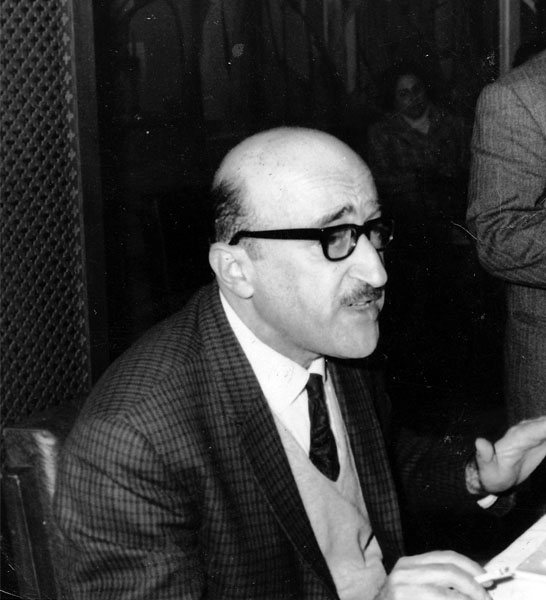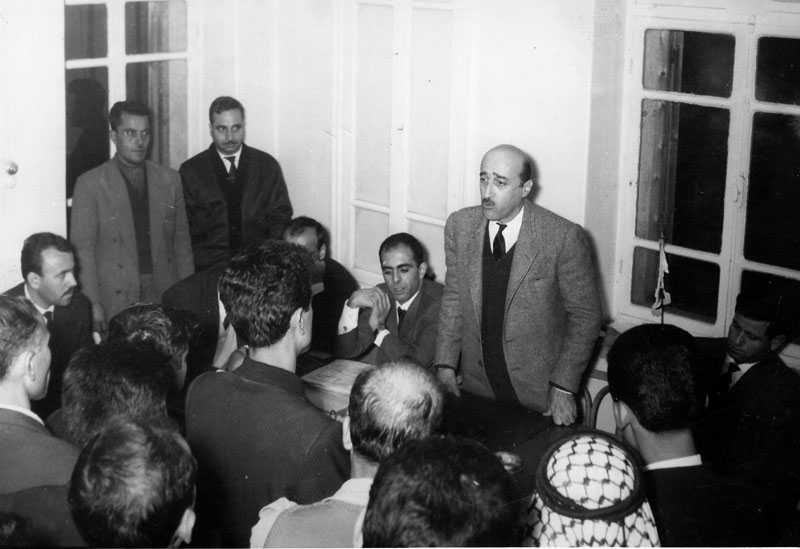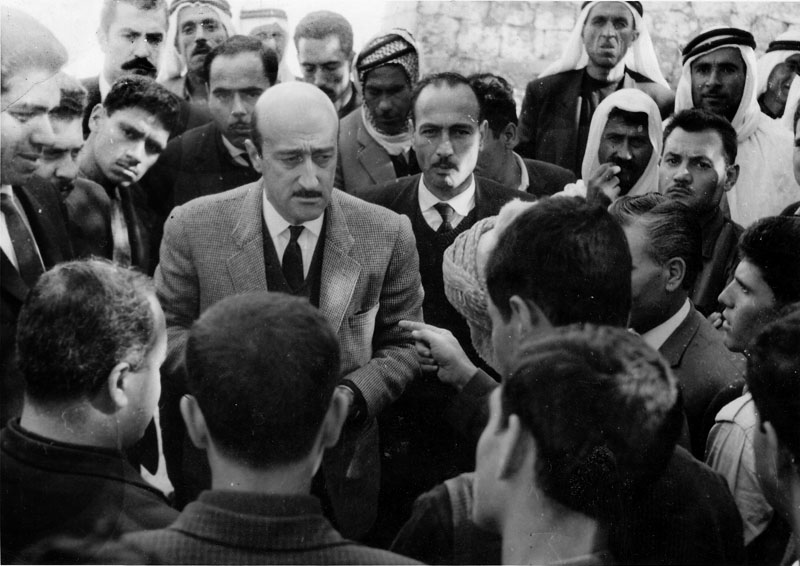<Back to Index>
- Secretary - General
of the National Command of the Arab Socialist
Ba'ath Party Munif
al-Razzaz, 1919
PAGE SPONSOR
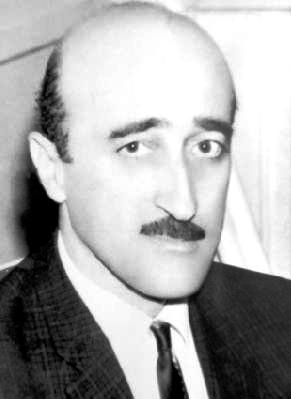
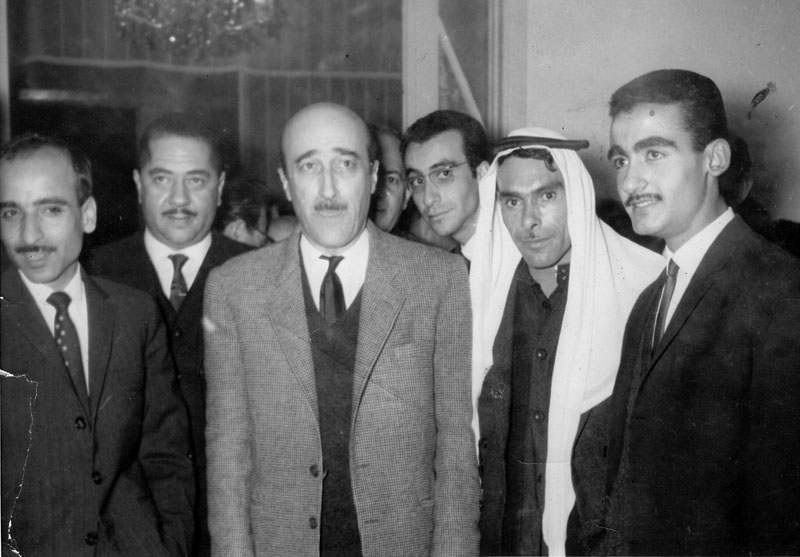
Munif al-Razzaz (19 December 1919 - 16 September 1984) was a Jordanian - Syrian Ba'athist physician, who was the second, and last, Secretary General of the National Command of the Arab Socialist Ba'ath Party, having been elected to the post at the 8th National Congress held in April 1965.
Razzaz was born in Syria in 1919 but was raised in Jordan. His family left Syria because his father was accused by the French authorities in Syria of collaborating with the rebels during the Great Syrian Revolt. In 1937 Razzaz was given scholarship at the American University in Beirut after having spent a brief period studying in Cairo. He studied law at Amman Arab University, and became a member of the Jordanese Regional Branch of the Arab Socialist Ba'ath Party in 1950. Razzaz was one of the co-founders of the Ba'athist Regional Branch in Jordan, and he promoted the Ba'athist ideology through his writings in national newspapers. From 1955 to 1957, the Jordanese Ba'athists were a leading voice in the anti - King Hussein movement. Razzaz criticized King Hussein's support of the Baghdad Pact, and his stance towards Gamal Abdel Nasser, the President of Egypt. Because of his anti - monarchist activities Razzaz was imprisoned in 1956, 1958, 1959 and 1960.
In the aftermath of the Ramadan Revolution which brought the Iraqi Ba'ath Branch to power in Iraq, Razzaz along with fellow Ba'athist Abdallah abd al-Da'im, was given the task of formulating a political program which was supposed to be broadcasted to the Iraqi people.
Razzaz was
elected Secretary General of the National Command at the
8th National Congress in April 1965, and succeeded Aflaq
in office. However, Razzaz was not rooted enough in Syrian
affairs to find a solution to the crisis which was taking
hold in Syria. In November 1965,
the National Command passed a resolution which forbade the
Syrian Regional Command to appoint or relieve officers.
The Military Committee led by Salah Jadid responded
immediately by rebelling. Razzaz then convened a emergency
session of the National Command which decreed the
dissolution of Yusuf Zu'ayyin's
government and the Syrian Regional Command, while they
decreed the establishment of a new leadership for Syria;
al-Bitar became Prime Minister, Muhammad Umran became Minister of Defense, Amin
al-Hafiz became Chairman of a new Presidential
Council, and Mansur al-Atrash became Chairman of
the National Revolutionary Council.
Jadid and his supporters replied by carrying out the 1966
Syrian coup d'état which led to the downfall of the
National Command and the moderate faction within the
Ba'ath Party.
Following the downfall of Michel Aflaq, Salah al-Din al-Bitar and the moderates in general in the 1966 coup, Razzaz went underground. He became the only member of the old National Command to put up any resistance against Jadid's neo - Ba'athist regime. On his ascension to office, Razzaz relationship with Aflaq deteriorated even if it was the Military Committee, and not Razzaz, who forced him from office.
Shortly after the 1966 coup, Colonel Salim
Hatum began planning a conspiracy which would
topple the Jadid regime. Hatum forged an
alliance with Razzaz, encouraged by messages from comrades
from the old National Command, began recruiting military
officers to his cause. He managed to form a Military
Committee led by Druze officer Major General Fahd al-Sha'ir. The coup was
discovered by the authorities in August 1966, and Razzaz
and fellow conspirators were forced either into hiding or
into Lebanon. Razzaz period underground had unsettled him
mentally, a state of mind which becomes apparent in his
book The Bitter Experience, published in 1967. He became a member
of the Palestinian Iraqi aligned Ba'athist organization
Arab Liberation Front in 1966, and through it, rose
through the Iraqi dominated Ba'athist structure. In 1977
he became a member of the Iraqi dominated National
Command. Razzaz was put
under house arrest in Baghdad on the orders of Saddam
Hussein because of his political views. He died in house
arrest in 1984.
In the article "Ba'ath Socialism" in the Iraqi newspaper Iraq Today Razzaz stated that Ba'athist socialism was scientific socialism, and that it "was the natural and inevitable response to the contradictions between the Arab nation and home land, with colonialism, imperialism and backwardness, both inherited and recent. It is a natural response to natural struggle blended with class struggle." Razzaz laid emphasis on the fact that Ba'athist socialism was both scientific and moral, and that Ba'athist socialism was a form of Third World Socialism and not the form of socialism of the First, Second, Third or Fourth Internationals. These forms of socialism derived "their character from pure class contradictions inside imperialist industrialized societies. It is a socialism which draws its basic properties from the contradictions of the Third World with imperialism on the one hand, and backwardness on the other". Ba'athist socialism, in his mind, opposed full state ownership of the economy, but supported state ownership over the heights of the economy. In his influential 1957 article "Why Socialism Now?" Razzaz states; "Socialism is a way of life, not just an economic order. It extends to all aspects of life – economics, politics, training, education, social life, health, morals, literature, science, history, and others both great and small. Socialism, freedom and unity are not different names for different things ... but different facets of one basic law from which they spring." Together with Michel Aflaq and Gamal al-Atasi Razzaz wrote Articles on Socialism in 1974.
In a paper entitled "Arab nationalism" Razzaz asserts
that Arab nationalist ideology is "the driving force
behind the Arabs in their struggle to create a progressive
nation that can hold on its own with the nations of the
world." Razzaz believed that the Arabs had a sense of
belonging to an Arab identity which could be traced back
to pre-Islamic days. He believed that the Arab world was
first confronted by Western colonialism at the beginning
of the 16th century in the Persian Gulf and the Indian
Ocean. The 1948 Arab - Israeli War "which brought the
humiliating defeat of the Arabs by a handful of Jews, was
the last straw that destroyed any remnants of confidence
between the ruling classes on one side and the masses on
the other." Resentments towards the Western powers for
creating Israel could never be forgotten Razzaz believed,
and the creation of Israel led to the popular demand of an
end to all Western tutelage in the Arab world. Razzaz
claimed that Arab nationalism was the conflict between two
forces; the reactionary classes and the masses. The
reactionary classes were inefficient vassals of Western
capitalist imperialism who had betrayed the nation, while
the masses were "anti - imperialist, anti - capitalist and
anti - Zionist, and in favor of unity, freedom, socialism
and neutralism."
